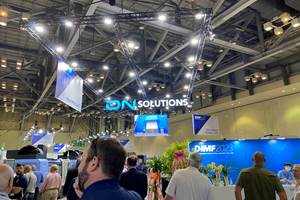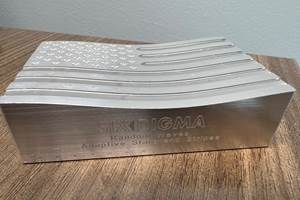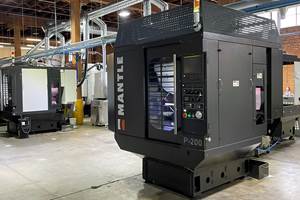Inside Machineosaurus: Unique Job Shop with Dinosaur-Named CNC Machines, Four-Day Workweek & High-Precision Machining
Take a tour of Machineosaurus, a Massachusetts machine shop where every CNC machine is named after a dinosaur!
Share



Autodesk, Inc.
Featured Content
View More

Takumi USA
Featured Content
View More


Hwacheon Machinery America, Inc.
Featured Content
View More
Take a tour of Machineosaurus, a Massachusetts-based machine shop where every CNC machine has its own dinosaur name! Join Matt and Leigh Ann Boucher as they walk you through their shop’s lineup of CNC mills and lathes, from Allosaurus to Triceratops. Machineosaurus specializes in prototyping, production, repair, and assembly of CNC machined parts and offers a unique twist with its four-day workweek aimed at boosting productivity and work-life balance. Get insights into their production process, quality control, and their upcoming 5S project.
TRANSCRIPT:
Matt: Hi, I'm Matt Boucher and along with my wife Leigh Ann and our dog Mookie, here, we own the Machineosaurus Manufacturing Company. We're a small machine shop in Bridgewater, Massachusetts, primarily doing job shop work. We have been working to grow the production side of our business, but primarily we're doing job shop work today. We've got seven employees in the back, and we'll be showing you the shop here in a minute. We've got six CNC mills and one CNC lathe and a whole bunch of manual equipment back there.
We're excited to show you what we've got here today. Today is actually Thursday, and we work a four day workweek here at Machineosaurus, which means that today is our Friday. We work 6 a.m. to 4 p.m., something that the team loves. It's something that we love as business owners because we can spend our Fridays working on our business rather than in our business, and it's something that has actually increased our productivity.
We have six CNC mills. Five of them are three axis machines. One of them is a four axis machine. And one of the things we've done to organize our business is we numbered the machines, but we've also named the machines after dinosaurs. So if you take a look around here at our VF0, this is machine number one. And it is the first machine that this company bought, and this is the Allosaurus. And it is towards the end of the day so we're starting to shut the machines down but of course we have machines running still at the same time.
This is our VF2 machine. This is where we're running one of our production jobs.We're making heatsinks for a customer and this is the T-Rex. And you can see that the T-Rex is doing a good job of making some teeth.
Walking it to our manual machining area. This is also where we keep a lot of our test equipment and other items that we need to use for the business, collets and things like that. We have three manual lathes in this area, and then we have three knee mills in this area. We love our manual machines. We use the CNCs these mostly, but you know, some days there's just no substitute for that manual machine.
Have fun at the Rolling Stones.
Povel: Yeah, the Stones. You know, Mick Jagger is living forever.
Matt: Are you older or younger than Mick Jagger?
Povel: We are about the same age.
Matt: You're about the same age. Can you dance the same way?
Povel: Of course.
Matt: Hey, this is Povel. Povel is one of our senior machinists here. A brilliant, brilliant machinist. If you need somebody to make a complex part and figure out how to make it, this is your guy.
Povel: It depends on the time of the day, though.
Matt: Coming into this area, we've got our VF1, Megalosaurus. There's a tent around this machine because we were actually working with syntactic foam, and it gets a little bit dusty. And so we put up this tent, and we have one of those, like, sawdust catcher ventilator things like you get for, a workshop. We do that to keep the dust from getting everywhere else in the shop. This is another VF-0E. I don't even know how to say this. This is parasaurolophus.
Phil: Parasaurolophus.
Matt: That's our son, Phil, he works in the shop.
Phil: That’s an 0e, this is an 0.
Matt: And you can look at the chips in there. You can see we're doing a lot of stainless steel today, so we're having fun cutting stainless steel today. Or, you know, as the guys will tell you, not so much fun.
Moving into our second bay, we love our Cosen auto saw. This is such a time saver for us as we're setting up jobs. We can program this machine, and we can walk away. And it will cut parts to length for us so that we can get them set up to go in the machines.
Coming over here, we've got our CNC lathe. I love the lathe. It makes parts so fast. This is Iguanodon and we are right now making these things which, you know, are pretty cool. That's stainless steel.
We have two VF-4s in this room. The VF-4s are nice because we can do big plate work on them. We've got a work envelope of 50in by 20in on these. And, we love doing plate work here at Machineosaurus. It's a lot of fun for our team. We've got, this VF-4, which is the Ankylosaurus, and you can see Cody working on a part in there right now. Smile pretty for the camera, Cody.
Cody: My smile is ugly.
Matt: And then we've got Triceratops, my personal favorite dinosaur. And the Triceratops is also in use right now. We've got a first article inspection going on right here. So that's why it's not running at the minute. But as soon as we proven out that we're happy with the part, we'll start running them, and then we'll run and process inspections on those parts as we go.
We want to show you some of our quality equipment. And so you can see we've got our optical comparator right here. We actually have height gauges throughout the shop. We've got our engineering station here where we do, a lot of our programing for more complex parts. Quite a few of our team can program manually as well. So depending on the part, we might just write a simple program right at the machine. Or we'll come over here, get into fusion 360, and we'll go ahead and make, you know, a more complex program for a more complex part.
One of the things we're super proud of here at Machineosaurus, and one of the things we did right away when we bought the business about a year, year and a half ago was establish our core values. And the core values are pretty simple, but they guide us and everything we do here as we work to grow and build this business from a smaller, almost sole proprietorship business into something now with seven employees and, you know, quite a bit more volume going through it.
Now, one of the things we're about to kick off is a 5S project. We've actually, aligned with the Massachusetts Manufacturing and Engineering Partnership, and they're going to help us with that with some grant money and some training. And for, you know, other machine shops, I would encourage you to take advantage of your MEPs in your state. It's a federally funded program designed to foster growth and innovation in smaller manufacturing companies.
So if you look around here, we got a big brand new shelf that we bought. This is going to be going over to the other side of the shop where we're making some room. And this is going to be used to hold all of our fixtures. We just got it put together. And part of the 5S project is making a home for everything. And so that's going to be the home for all of our fixtures.
I do want to show you my very favorite machine in the shop. And it's not a super exciting machine. And a lot of you probably have one. But it is our Mr. Debur tumbler. And the thing I love about a tumbler is when I hear this thing running, I know that we're about to ship parts. And in the machine shop business, you know, we always talk about making chips, but I really like to focus on making ships. And when we ship apart, we get to bill a customer for a part. And, you know, eventually we get paid for that part. And that is a great feeling when I hear that machine running, I love it when I hear it running all day. That means we're going to have a really good day.
We've also got some other equipment down here. We have our surface grinder. We use this primarily for adjusting tools and end mills and things like that. We do we do a little bit of work on it, but we don't do that much surface grinding work. we've got a cold saw here for things that just don't make sense on that auto saw. For example, we do work with some thin walled pipe and the jaws on that saw will crush that pipe. We got a visitor in the shop today. There he is. He's come, come out. Wanted to say hi to everybody. Again that's Mookie. He's the shop mascot. And he's excited to be here today too.
Mookie: 🐶
Matt: I thought one last interesting way to look at our shop would be to think about how a part moves through our shop, because it can be different how it moves through other shops. Now, this is a, the old, sample part that Xometry used to have its partners make. And, so I just use that because it's, it's something that's out in the public domain and isn't anybody's, you know, proprietary information. But, you know, what'll typically happen is, is we'll get, a customer will email us a part, and we'll use Paperless Parts to go ahead and build our quote. assuming they like what we have to say about that, we’ll then, you know, take that part and enter it into our ERP system.
We use StartProto as an ERP system. And from there we will then be able to create the routing and the work order and and everything sort of flows from there. So this is what one of our work order packets looks like. You can see that we've got a work order in here. We have the print. So the prints in there, once we have the print, we have our, our inspection reports. We're actually about to move our inspection reports into the ERP system, but for now, they are still paper based.
We then tie these back to everything associated with that work order. This part would then go to programing. I actually printed out the program in here. I wont to show it to you. but that's why this is so thick, is we do have the program. And the first page of the program, which we do print out for everybody has the job setup instructions. So it'll tell our team how many operations they're going to be running. It will tell our team, what tools to put in if they need work holding, etc. and once we have that, we'll go ahead and we'll get the the material ordered. Material for us on average comes in in a day or two. If it's something a little more unique or exotic, it might or something that needs to be cut. It might take a little longer than that, but usually no more than a week. And, once we get that, we get it on the schedule and off we go.
Brent: Hey Everybody, Brent Donaldson with Modern Machine Shop here. And if you just watched that video and you're thinking, boy, I'd like my shop to be featured in The View From My Shop Series, then just send us an email at ShopVideo@MMSOnline.com and tell us what sets your shop apart.
Related Content
DN Solutions Responds to Labor Shortages, Reshoring, the Automotive Industry and More
At its first in-person DIMF since 2019, DN Solutions showcased a range of new technologies, from automation to machine tools to software. President WJ Kim explains how these products are responses to changes within the company and the manufacturing industry as a whole.
Read MoreBuilding Machines and Apprenticeships In-House: 5-Axis Live
Universal machines were the main draw of Grob’s 5-Axis Live — though the company’s apprenticeship and support proved equally impressive.
Read MoreHow I Made It: Amy Skrzypczak, CNC Machinist, Westminster Tool
At just 28 years old, Amy Skrzypczak is already logging her ninth year as a CNC machinist. While during high school Skrzypczak may not have guessed that she’d soon be running an electrical discharge machining (EDM) department, after attending her local community college she found a home among the “misfits” at Westminster Tool. Today, she oversees the company’s wire EDM operations and feels grateful to have avoided more well-worn career paths.
Read MoreIn Moldmaking, Mantle Process Addresses Lead Time and Talent Pool
A new process delivered through what looks like a standard machining center promises to streamline machining of injection mold cores and cavities and even answer the declining availability of toolmakers.
Read MoreRead Next
5 Rules of Thumb for Buying CNC Machine Tools
Use these tips to carefully plan your machine tool purchases and to avoid regretting your decision later.
Read MoreRegistration Now Open for the Precision Machining Technology Show (PMTS) 2025
The precision machining industry’s premier event returns to Cleveland, OH, April 1-3.
Read MoreBuilding Out a Foundation for Student Machinists
Autodesk and Haas have teamed up to produce an introductory course for students that covers the basics of CAD, CAM and CNC while providing them with a portfolio part.
Read More











































.jpg;maxWidth=300;quality=90)








